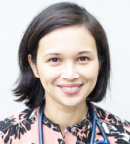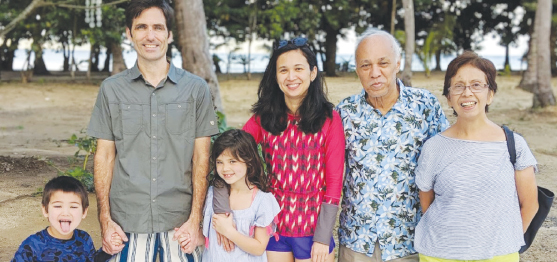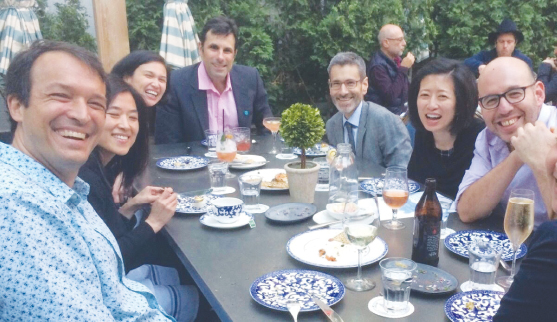
Cristina P. Rodriguez, MD
Head and neck cancer specialist Cristina P. Rodriguez, MD, was born and reared in Manila, the capital and largest city in the Philippines. “I grew up on the campus of the University of the Philippines, as both my parents were professors. I am one of three girls, and there was quite a bit of stress put on us to pursue higher education. I also have a large extended family, and many of my close relatives are physicians,” said Dr. Rodriguez.
She continued: “My father’s oldest brother was an ear, nose, and throat specialist who practiced in rural Mindanao, in a clinic that was in his house, which he kept open to members of the community who had limited resources. I always admired his compassion and devotion to his patients. That early exposure was what clearly had the most impact on my decision to pursue a career in medicine,” Dr. Rodriguez explained.
Fast Track to Medicine
After graduating from high school, Dr. Rodriguez was accepted into an accelerated track that took her directly from an attenuated undergraduate program directly into the University of the Philippines Medical School.
NAME
Cristina P. Rodriguez, MD
TITLE
Associate Professor, University of Washington School of Medicine; Associate Member, Clinical Research Division, Fred Hutchinson Cancer Research Center/Seattle Cancer Care Alliance, Seattle
MEDICAL DEGREE
MD, University of the Philippines College of Medicine
“I was only 16 when I left home to pursue my medical degree. I ended up working at the Philippine General Hospital, the government-funded university hospital. It was a transformative experience; even though I grew up in a developing country, I was fairly sheltered by my life at the university. Working in the government hospital was the first time I came face to face with the serious health implications of poverty, where dedicated nurses and doctors practiced in a resource-restricted setting,” said Dr. Rodriguez.
“I saw cases of preventable illnesses, such as advanced cancers, that could have been diagnosed early if screening programs were available,” she shared. “The experience working at the government facility helped me understand the need to prioritize my efforts as well as balance decisions and recommendations on a scale of practicality. I learned that it is all about the circumstances of each individual patient.
“Working in the government hospital was the first time I came face to face with the serious health implications of poverty….”— Cristina P. Rodriguez, MD
Tweet this quote
A Bleeding Disorder and a Mentor
Asked why she chose oncology as a specialty, Dr. Rodriguez responded: “I was 3 years away from graduation and doing an internal medicine rotation when I developed a bleeding disorder and was admitted to the hospital. Cynthia Dominguez, MD, a member of the faculty and a hematologist/oncologist, took over my care. I had a rather common disorder that develops in younger women. I ended up missing many weeks of my rotation, but Dr. Dominguez helped me make up the time I lost by allowing me to work during the summer in her hematology-oncology practice. I fell in love with the field and decided I wanted to become an oncologist. Dr. Dominguez helped me with my application and gave me a lot of encouragement.”
Dr. Rodriguez attained her medical degree from the University of the Philippines College of Medicine at just 22 years old. Shortly after, she immigrated to the United States.
“I went straight from Manila to do my residency at the Cleveland Clinic Foundation. It was, to say the least, another transformational event in my life,” she noted. “I was young and flexible, but I underestimated how challenging it would be to move halfway across the world to another country and practice medicine in a completely different culture. I’d never experienced winter before, and snowstorms were a bit of a shock. I found that Cleveland Clinic and the Philippines General Hospital were similar in some ways and completely different in other ways. Cleveland Clinic was a huge tertiary center with a lot of extremely challenging cases; both places offered amazing training experiences. Although it took a while for me to adjust to life in the United States, I ultimately found Cleveland to be a great place to live and work.”

Dr. Rodriguez with her husband, children, and parents during a recent trip to the Philippines
A Mentor Guides Career Choice
“A few months after moving to the Cleveland Clinic, I had my first rotation as an intern in medical oncology,” Dr. Rodriguez continued. “My attending was David Adelstein, MD, senior head and neck medical oncologist. He was an astute and compassionate clinician, and took the time, despite the inpatient service, to teach us residents and interns,” said Dr. Rodriguez.
“Dave taught me that head and neck cancers are particularly challenging because the goals are not only to provide the patient with the best oncologic outcome, but also to provide the best functional outcome. I liked being involved in that clinical challenge. Dave was very involved in clinical trials in this challenging population. Up until then, I hadn’t settled on what type of cancer I wanted to specialize in, but being Dave’s mentee led me to decide to focus on head and neck cancer,” said Dr. Rodriguez.
“Head and neck cancers are particularly challenging because the goals are not only to provide the patient with the best oncologic outcome, but also to provide the best functional outcome.”— Cristina P. Rodriguez, MD
Tweet this quote
Moving West
Dr. Rodriguez met her future husband, who is also a medical oncologist, at Cleveland Clinic. After some serious soul-searching, they decided to move to the West Coast, where he originally trained. Dr. Rodriguez took a position as Assistant Professor at the Oregon Health & Science University. “When an opportunity at the Univserity of Washington/Seattle Cancer Care Alliance/Fred Hutchinson Cancer Research Center came up, we took it, and we’ve been here for about 6 years now. I’m very fortunate to be a part of this institution, I’m surrounded by very talented colleagues who are also my friends,” said Dr. Rodriguez.
As for her current responsibilities, they continue to evolve. “I’ve learned so much from being part of the cooperative group NRG, the National Comprehensive Cancer Network® (NCCN®) Clinical Practice Guidelines in Oncology Panels and ASCO’s guidelines panels as well. I’m continuing to explore other emerging professional opportunities.”

Dinner with Dr. Rodriguez’s work family (L-R): Dr. Renato Martins, Dr. Christina Baik, Dr. Cristina Rodriguez, Dr. Bernardo Goulart, Dr. Eduardo Mendez (now deceased), Dr. Sylvia Lee, Dr. Rafael Santana-Davila (not in photo Dr. Keith Eaton)
Dr. Rodriguez begins her busy day with an intense 2-hour rush to get her 4- and 7-year-old children ready for school. “After I drop my kids off at school and get to my office, I actually have a few minutes to decompress and gather myself for the day ahead. Generally, half of my time is spent in the clinic seeing patients, here at the Seattle Cancer Care Alliance and at the University of Washington. My clinic is almost all patients with head and neck and salivary gland cancers. The other half of my time is spent overseeing and running clinical trials, as well as collaborating with our research group to come up with strategies to open new studies,” said Dr. Rodriguez.
How does a busy clinician-researcher balance her day? “My husband and I try to organize our schedules so we can pick our kids up from school. The first few hours at home are pretty hectic, catching up with our kids, running here and there to school activities, and getting them into their homework. We believe strongly in family and we try to cook at home and have family meals together.”
Dr. Rodriguez acknowledged the built-in stress of a career in oncology and said she and her husband try to leave their work at the clinic.
“We attempt to create a level of balance and harmony in life, so our kids can see parents who love what they do but are not consumed by it.”— Cristina P. Rodriguez, MD
Tweet this quote
“We attempt to create a level of balance and harmony in life, so our kids can see parents who love what they do but are not consumed by it. Moreover, the Pacific Northwest is just magnificent; so far, we’ve only scratched the surface of its physical beauty. We like to spend time outdoors. I recently became part of a book club, which is a great way to decompress and get away from work. We are also season ticket holders of the Seattle Sounders soccer team. My life is full, sometimes hectic, but very rewarding, both personally and professionally.” ■

